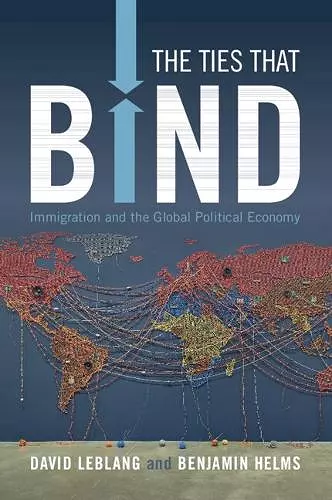The Ties That Bind
Immigration and the Global Political Economy
David Leblang author Benjamin Helms author
Format:Paperback
Publisher:Cambridge University Press
Published:9th Feb '23
Currently unavailable, and unfortunately no date known when it will be back
This paperback is available in another edition too:
- Hardback£70.00(9781009233224)

Immigration integral to globalization, creating connections and mobilizing investments in human and financial capital across countries.
Migration is the central domestic and global political issue of the day, yet its causes and consequences are poorly understood. This book explores the political, economic, and social factors contributing to migration, the ways migration helps foster global economic exchange, and the role remittances play in the global circulation of people.Migration is among the central domestic and global political issues of today. Yet the causes and consequences - and the relationship between migration and global markets – are poorly understood. Migration is both costly and risky, so why do people decide to migrate? What are the political, social, economic, and environmental factors that cause people to leave their homes and seek a better life elsewhere? Leblang and Helms argue that political factors - the ability to participate in the political life of a destination - are as important as economic and social factors. Most migrants don't cut ties with their homeland but continue to be engaged, both economically and politically. Migrants continue to serve as a conduit for information, helping drive investment to their homelands. The authors combine theory with a wealth of micro and macro evidence to demonstrate that migration isn't static, after all, but continuously fluid.
'Migration has often been ignored in international political economy, and Leblang and Helms provide a terrific corrective to this blind spot. Tracing the migration process from the decision to leave through where to go and whether to send back remittances, they convincingly show that politics-not just economic or social factors-affects every step in the migration process. Leblang and Helms then turn from explaining the migration process to demonstrating that migrants are the glue that helps hold global finance together. This book is a must-read not only for migration scholars but for all those interested in the global economy.' Margaret Peters, UCLA
'The Ties That Bind is a powerful book showing how political institutions intimately shape each part of the process by which people (legally) move to another country. The book argues that such international migration benefits both migrant-sending and -receiving countries, largely because migrants are crucial facilitators of international capital flows. The authors develop important new ideas about policies that help sending and receiving countries reap these benefits while managing migrant flows.' Helen V. Milner, B.C. Forbes Professor of Public and International Affairs, Princeton School of Public and International Affairs
'This book sheds fresh light on the political economy of international migration. Leblang and Helms conduct a sweeping and insightful analysis of the political factors that lead people to migrate and influence where they choose to relocate. They also persuasively demonstrate that international migration plays a crucial role in shaping the global political economy. Combining clear and sharp theorizing with rigorous data analysis, this is a study that a wide range of social scientists will benefit from reading.' Edward D. Mansfield, Hum Rosen Professor of Political Science
'Can international migration be the glue that binds the global political economy together, benefiting both migrant-sending and -receiving countries? Yes. But it depends. In The Ties That Bind, Leblang and Helms masterfully demonstrate with a wealth of data how politics and institutions, such as migrant rights and dual citizenship, determine migration intentions, where people migrate to, and how migrants remain connected to their homelands. A must-read for scholars and global policy-makers.' Maarten Vink, Chair in Citizenship Studies, European University Institute
'The book adds a political emphasis to the usual focus on economics, demography, and sociology. … Recommended.' J. E. Weaver, Choice
ISBN: 9781009233279
Dimensions: 228mm x 152mm x 15mm
Weight: 390g
278 pages